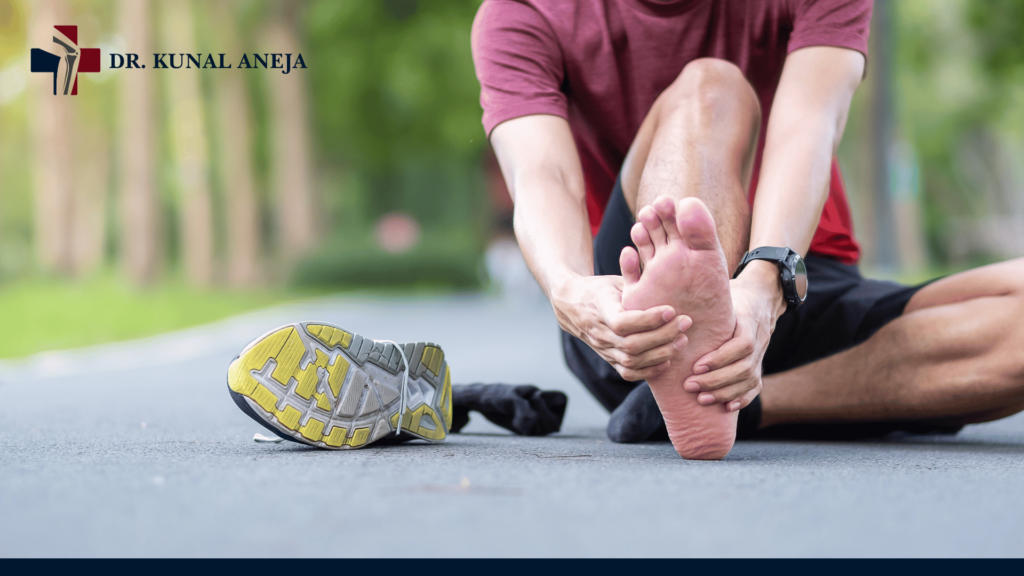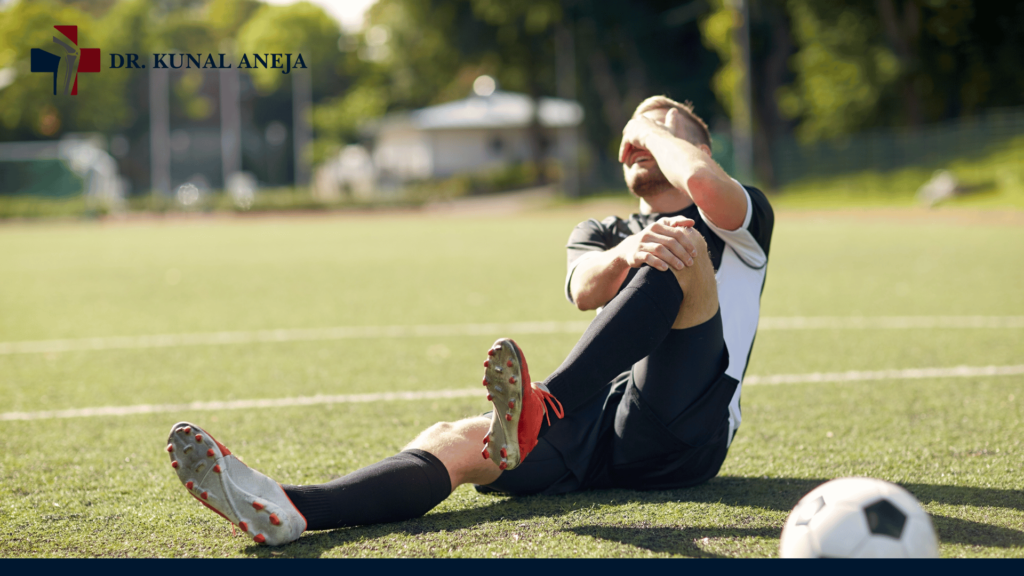Overview
Seeking the best Sports Injury Treatment clinic in Delhi is essential for a speedy and thorough recovery. Dr. Kunal Aneja is a triple board-certified and fellowship-trained orthopaedic surgeon who stands out in the field of sports medicine. Perhaps you are an athlete who is passionate about your sport and pushes yourself to the limit in every game, but then you suddenly get hurt in a sport. With broad preparation in automated/route joint substitution and arthroscopy keyhole medical procedures at prestigious focuses around the world, Dr. The treatment at Aneja’s clinic is exceptional. His devotion to the adage “Life is development, Development is Life” guarantees that patients recover their portability and return to their maximized execution.
What are the Most Effective Treatments for Common Sports Injuries?
Most sports injuries can be treated with a combination of the following:
- The RICE Method: Elevation, ice, compression, and rest are the first steps to lessen pain and swelling.
- Exercises: Designed to strengthen the injured area and restore function are part of physical therapy.
- Medications: medications that reduce inflammation and pain.
- Careful Mediation: In serious cases, medical procedure might be important to fix harmed tissues.
Athletes benefit from having a solid understanding of these treatments when making decisions regarding their recovery.
How Can Athletes Prevent Sports Injuries and Enhance Performance?
The key to avoiding sports injuries and increasing performance is prevention:
- Legitimate Warm-Up: Participate in unique extending and light cardio before exercises.
- Strength training: Strengthen your muscles to support your joints and avoid injuries.
- Improve your technique: By learning and practicing the right techniques for your sport.
- Nutrition and hydration: To support overall health, drink plenty of water and eat a well-rounded diet.
Carrying out these preventive measures can fundamentally lessen the gamble of wounds.
What Should You Do Immediately After Sustaining a Sports Injury?
To effectively manage sports injuries, immediate care is essential:
- Put: An end to all activities to prevent further harm.
- Ice: Ice packs can be used to numb the area and reduce swelling.
- Compression: To reduce swelling, wrap an elastic bandage around the injured area.
- Rise: Keep the harmed part raised above heart level to limit expanding.
The injury can be less severe and heal more quickly if these steps are taken.
Why is Rehabilitation Critical in Sports Injury Treatment?
Recuperation requires recovery as a vital part:
- Strengthening: Specific workouts assist muscles in regaining their endurance and strength.
- Restoring Mobility: Joint flexibility and function can be improved through stretching and mobility exercises.
- Recovery programs: Train patients appropriate procedures and preventive activities to assist with keeping away from re-injury.
- Mental health: Athletes can receive psychological support from rehabilitation that keeps them motivated and upbeat.
A safe and complete return to athletics is made possible by complete rehabilitation.

How Do Advanced Diagnostic Tools Improve Sports Injury Treatment?
Modern diagnostic tools make treatment plans more accurate and effective:
- X-ray and CT Sweeps: Give point by point pictures of delicate tissues and bones. Real-time muscle and tendon injuries can be assessed with ultrasound.
- X-rays: useful for identifying joint abnormalities and fractures.
- Arthroscopy: An insignificantly intrusive strategy that permits direct perception of the joint inside.
These high level devices empower exact finding, prompting more compelling treatment systems.
What Role Does Nutrition Play in Recovering from a Sports Injury?
The healing process is significantly influenced by nutrition:
- Protein: Fundamental for tissue fix and muscle recuperation.
- Minerals and vitamins: Bone and tissue health depends on calcium, vitamin D, and vitamin C.
- Hydration: Satisfactory water consumption upholds generally speaking physical processes and recuperating.
- Anti-Inflammatory Foods: Omega-3-rich foods aid in reducing inflammation.
A diet that is well-balanced and full of these nutrients can speed up recovery and boost overall health.
How Can a Multidisciplinary Approach Benefit Sports Injury Treatment?
Comprehensive care is provided by combining various medical specialties:
- Orthopaedic surgeons: Treat musculoskeletal conditions both surgically and non-surgically.
- Physiotherapists: Plan recovery projects to reestablish capability and forestall re-injury.
- Nutritionists: Provide dietary guidance to aid in recovery and health as a whole. Sports
- Clinicians: Furnish emotional well-being backing to adapt to the mental effect of wounds.
A multidisciplinary approach ensures that the athlete’s health in all aspects is taken care of, resulting in optimal recovery.
Why Dr. Kunal Aneja is the Best Sports Injury Treatment Surgeon in Delhi
The sports injury treatment clinic run by Dr. Kunal Aneja stands out as the best in Delhi. With broad preparation in cutting edge careful methods and a patient-focused approach, Dr. Aneja offers unrivalled consideration. His obligation to reestablish portability and improve personal satisfaction is reflected in his aphorism: “Life is development, Development is Life.” Trust Dr. Kunal Aneja and his team for comprehensive treatment that works, so you can get back to your sport quickly.

Conclusion
All in all, picking the Best Sports Injury Treatment clinic in Delhi is essential for a fruitful recuperation. The expertise and dedication of Kunal Aneja make his clinic the best option for athletes who want the best care. Try not to let sports wounds sideline you — look for the best treatment and get ready to rock ‘n roll.
FAQs
1. How do I schedule a visit with Dr. Aneja Kunal?
Ans. You can book an arrangement by visiting Dr. the official website of Aneja or by contacting his clinic directly.
2. What kinds of injuries from sports does Dr. Treat Kunal Aneja?
Ans. Dr. Aneja treats a wide range of sports injuries, such as tendonitis, ligament tears, and fractures.
3. Is it always necessary to have surgery for sports injuries?
Ans. Sometimes not. Many Sports Wounds can be actually treated with non-careful strategies like exercise based recuperation and prescriptions.
4. What amount of time does the recovery interaction require?
Ans. The length of time varies from a few weeks to several months, depending on the severity of the injury and the patient’s response to treatment.
5. What should I bring to my initial appointment with the doctor?
Ans. Include a list of your current medications, any imaging studies (X-rays, MRIs), and your medical records.

